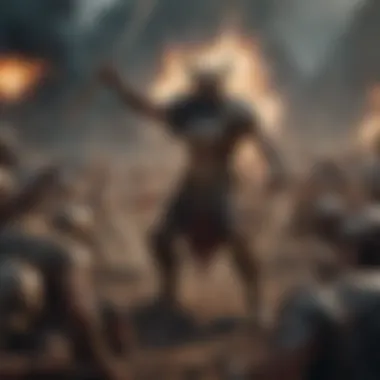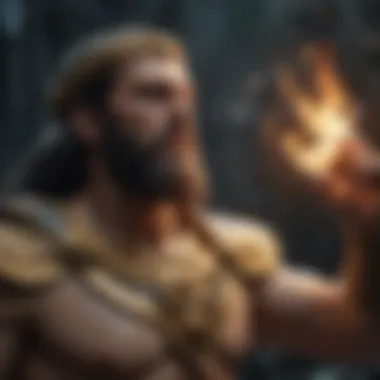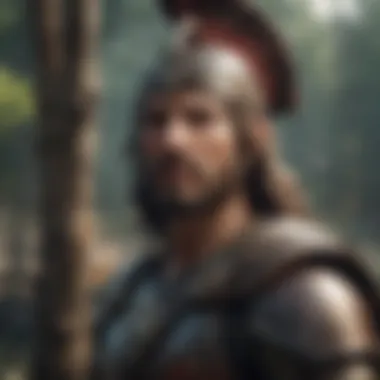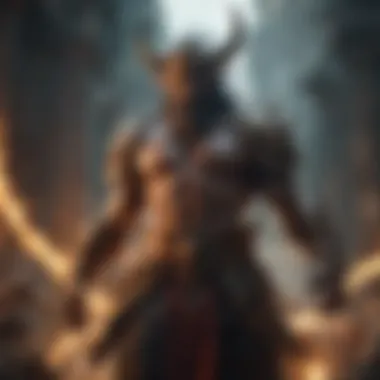God at War: Unveiling the Intricate Dynamics of Divine Conflict in Mythology


Games News
In the realm of mythology, divine conflicts reign supreme, mirroring the everlasting struggles of gods eternally vying for power and supremacy. These mythological narratives are not mere stories; they delve deep into the complexities of divine battles and the moral shades of grey that come with them. Through intricate analyses, one can uncover the layers of conflict, ambition, and consequence that shape the dynamics of gods at war.
Reviews
As we navigate the intricate tapestry of mythological conflicts, it becomes crucial to evaluate the gods' actions, their motivations, and the repercussions of their eternal clashes. Just as game reviews offer insights into the gameplay, graphics, and experience of a video game, delving into the narratives of divine battles allows us to intricately analyze the underlying themes, character developments, and the moral dilemmas portrayed in mythological sagas.
Unique Features
Amidst the chaos of divine conflicts lie hidden gems of wisdom and insight waiting to be unearthed. Much like discovering lesser-known games or game features that surprise and captivate players, exploring the nuances of different mythologies can reveal profound revelations about human nature, power dynamics, and ethical choices. By shining a spotlight on these lesser-explored facets, we can uncover the richness and depth of gods at war, offering a fresh perspective on age-old tales.
Introduction
Understanding Mythological Conflict
Defining Godly Battles
Delving into the concept of Defining Godly Battles provides a foundational understanding of the core elements that drive the narrative of mythology. These mythical battles between gods signify more than mere physical confrontations; they represent cosmic conflicts that mirror human struggles on a grand scale. The key characteristic of Defining Godly Battles lies in their symbolic significance, transcending the realm of mere storytelling to embody universal themes of power, morality, and destiny. This aspect is a crucial choice for this article as it sets the stage for a deeper exploration of divine conflicts and their implications. The unique feature of Defining Godly Battles lies in their ability to encapsulate complex emotions and moral quandaries within a dynamic narrative structure, making them a compelling focal point for analyzing mythological landscapes.
Significance of Mythological Wars
The exploration of the Significance of Mythological Wars enriches our understanding of the broader implications of divine conflicts in mythological narratives. These epic wars serve as allegorical representations of profound truths and enduring human experiences. The key characteristic of Significance of Mythological Wars is their ability to transcend time and culture, resonating with audiences across generations due to their universal themes and timeless relevance. This aspect is a valuable inclusion in this article as it allows for a comprehensive analysis of the moral, ethical, and existential dimensions depicted in mythological battles. The unique feature of Significance of Mythological Wars lies in their capacity to provoke contemplation on the nature of divinity, power dynamics, and the consequences of cosmic strife within the mythic realm.
Relevance of Godly Conflict Today
Analogies in Modern Society
Exploring Analogies in Modern Society bridges the gap between ancient mythologies and contemporary realities, offering intriguing parallels that shed light on societal structures and individual behaviors. Drawing connections between mythological conflicts and modern-day socio-political issues can reveal deep insights into human nature and cultural dynamics. The key characteristic of Analogies in Modern Society is its ability to juxtapose mythic motifs with present-day scenarios, highlighting continuities and disjunctions between past mythologies and current worldviews. This aspect enriches the discourse in this article by encouraging readers to reflect on the enduring relevance of mythological themes in navigating contemporary challenges. The unique feature of Analogies in Modern Society lies in its capacity to foster interdisciplinary dialogue and critical reflection, expanding the horizons of mythological scholarship beyond traditional boundaries.


Psychological Interpretations
Examining Psychological Interpretations offers a psychological lens through which we can decode the intricate layers of mythological conflicts and divine dramas. Viewing godly battles through psychological frameworks such as Jungian perspectives or Freudian interpretations unveils the subconscious motifs, archetypal symbols, and collective traumas embedded in mythic narratives. The key characteristic of Psychological Interpretations is its potential to illuminate the deeper psychological undercurrents of mythological tales, unraveling the complexities of human psyche and societal constructs mirrored in divine confrontations. This aspect adds depth to this article by introducing readers to nuanced analyses of mythological conflicts, inviting them to explore the intersection between ancient myths and modern psychology. The unique feature of Psychological Interpretations lies in its capacity to offer fresh insights and alternative interpretations that challenge conventional understandings of mythological themes and characters.
Historical Perspectives
In the context of this intricate exploration of godly conflicts in mythology, delving into historical perspectives becomes paramount. The analysis of historical backgrounds allows us to comprehend the evolution and significance of divine battles across different mythologies. By studying the historical contexts in which these myths originated, we gain valuable insights into the societal, cultural, and religious influences that shaped the narratives of gods at war.
When considering the importance of historical perspectives within this article, it is imperative to recognize that mythology is not just a collection of stories but a reflection of deeply-rooted beliefs and values of ancient civilizations. Greek, Norse, and Hindu mythologies, among others, offer a rich tapestry of mythological conflicts that are steeped in historical contexts, serving as windows into the belief systems and worldviews of ancient peoples.
By delving into historical perspectives, we can unravel the symbolic meanings behind these conflicts and their relevance to the societies that created them. Moreover, understanding the historical contexts of mythological narratives provides a nuanced lens through which we can interpret the complexities of gods at war, from power struggles to moral dilemmas.
Interpretations and Symbolism
Symbolic Representation
Good vs. Evil:
Good vs. Evil stands as a fundamental archetype in mythological storytelling, embodying the eternal struggle between moral opposing forces. In the realm of this article, the depiction of Good vs. Evil serves to elucidate the intricacies of divine conflicts and the underlying concepts of justice and righteousness. The portrayal of heroes battling malevolent entities resonates with audiences, tapping into universal values of virtue and courage. However, the oversimplification of morality into binary oppositions can sometimes limit the nuanced interpretations possible within mythological narratives.
Order vs. Chaos:
Another compelling aspect of Symbolic Representation is the dichotomy of Order vs. Chaos, a theme prevalent in mythological conflicts worldwide. Within the article's scope, the exploration of Order vs. Chaos sheds light on the societal structures and cosmological principles reflected in mythological tales. The eternal struggle between maintaining order and succumbing to chaos mirrors human endeavors to find balance and harmony in a volatile world. While Order provides stability and predictability, Chaos brings spontaneity and transformation, posing profound questions about the nature of existence and the role of gods in shaping the universe.
Psychological Archetypes
Jungian Perspective:
The Jungian Perspective offers a psychological lens through which mythological conflicts can be analyzed, focusing on the collective unconscious and archetypal motifs embedded in narratives. In the context of this article, delving into the Jungian Perspective unveils the deeper layers of meaning behind godly battles and power struggles. Jungian concepts such as the Hero's Journey and the Shadow archetype enrich the understanding of mythological conflicts, highlighting universal themes of transformation and individuation. By integrating Jungian perspectives, readers can appreciate the psychological depth of divine conflicts and the symbolic resonance they hold in personal and cultural psyches.
Freudian Interpretation:


Contrastingly, the Freudian Interpretation delves into the subconscious drives and desires influencing mythological characters' actions and motivations. Within the framework of this article, exploring Freudian themes unravels the complexities of divine interventions and ethical dilemmas depicted in mythological warfare. Freudian concepts like the Id, Ego, and Superego offer insights into the psychological dimensions of power dynamics and moral consequences within mythological narratives. By unraveling the unconscious motivations underlying godly conflicts, readers can gain a deeper understanding of the human psyche's intricate interplay with divine themes.
The Morality of Divine Conflict
Divine conflicts present in mythologies worldwide often serve as more than mere battles between gods; instead, they delve deeper into ethical dilemmas that resonate throughout history. The morality of divine conflict explores the complex interplay between gods, power, and consequences. By dissecting various mythological narratives, we gain insights into the ethical considerations embedded within these divine struggles. Understanding the morality behind such conflicts offers a unique perspective on the values and beliefs upheld by ancient cultures, providing a lens through which we can reflect on our contemporary ethical frameworks. The exploration of the morality of divine conflict in this article sheds light on the enduring relevance of these age-old tales and their impact on societal perceptions of right and wrong.
Ethical Dilemmas
Just War Theory
Just War Theory, a prominent ethical framework in the study of conflicts, has significant relevance when discussing divine battles. This theory outlines the conditions that must be met for a war to be considered justifiable, emphasizing principles of proportionality, discrimination, and legitimate authority. Within the context of divine conflicts, Just War Theory provides a structured approach to evaluating the ethics of godly battles. Its emphasis on moral considerations, such as the distinction between combatants and non-combatants, adds depth to the analysis of mythological wars. While Just War Theory offers a systematic way to assess the morality of conflict, its applicability to divine struggles raises intriguing questions about the nature of divine justice and the role of gods as moral agents.
Divine Intervention
Another crucial aspect of the ethical dilemmas surrounding divine conflict is the concept of divine intervention. In mythological narratives, gods often meddle in mortal affairs, either to influence the outcome of battles or to uphold a sense of cosmic order. Divine intervention raises ethical questions about the interference of deities in the lives of humans and the implications of divine manipulation. While divine intervention can be seen as a means to maintain balance or justice, it also introduces moral complexities regarding free will and individual agency. Examining the role of divine intervention in mythological conflicts offers a nuanced perspective on the ethical dimensions of godly interactions and their impact on mortal destinies.
Consequences and Aftermath
Cosmic Balance
The concept of cosmic balance plays a pivotal role in understanding the consequences of divine conflict. Mythologies often depict gods engaging in battles that disrupt the equilibrium of the cosmos, leading to repercussions that extend beyond the divine realm. Cosmic balance refers to the harmonious order within the universe, which gods are tasked with upholding through their actions. Exploring the concept of cosmic balance in the context of divine conflicts reveals the intricate connections between cosmic forces and moral responsibilities. By examining how gods navigate their power struggles while maintaining cosmic equilibrium, we glean valuable insights into the interplay between divine will and universal harmony.
Human Involvement
Human involvement in divine conflicts introduces a human dimension to the ethical considerations surrounding godly battles. Mortals often become embroiled in the disputes among gods, either as unwitting pawns or as active participants in divine wars. The role of humans in mythological conflicts raises questions about agency, accountability, and the complex interactions between gods and mortals. Examining human involvement in divine conflicts sheds light on the moral complexities faced by individuals caught in the crossfire of divine rivalries. By dissecting the consequences of human actions in the aftermath of divine battles, we unravel the intricacies of mortal choices within the larger tapestry of divine destinies.
Comparative Analysis
In the segment titled Comparative Analysis, we delve into the significance of scrutinizing multiple mythologies to discern commonalities and discrepancies. This thorough investigation provides a comprehensive understanding of how different cultures conceptualize divine conflicts, offering invaluable insights into human narratives across civilizations. By juxtaposing tales from various mythologies, we can identify recurring themes and motifs that transcend geographical boundaries and time periods. Through a comparative lens, we aim to unravel the universal truths and enduring enigmas embedded in the essence of godly struggles.


Cross-Cultural Examination
Similarities Across Mythologies
Exploring the theme of Similarities Across Mythologies unveils the threads that interlace diverse mythological traditions, enlightening us on the shared facets of human belief systems. This examination accentuates the archetypal motifs that echo through stories worldwide, highlighting the parallel structures that underpin cultural narratives on divine confrontations. The recognition of these common elements not only enriches our comprehension of mythological realms but also underscores the timeless resonance of fundamental human experiences brought forth by these tales.
Divergence in Themes
Within the realm of Divergence in Themes, we investigate how varying mythological traditions express unique perspectives on the dynamics of divine conflicts. By scrutinizing the divergent pathways taken by different cultures in elaborating on gods at war, we discern the nuanced nuances that shape mythic narratives and ideological dispositions. This analysis sheds light on the intricate tapestry of human imagination, showcasing the multifaceted interpretations and values attributed to conflicts of a divine nature.
Impact on Society
Religious Practices
Delving into Religious Practices, we unravel the profound influence of mythological tales on societal beliefs and rituals, examining how narratives of godly conflicts permeate cultural practices and spiritual ideologies. Through this exploration, we grasp the integral role mythologies play in shaping religious customs and moral frameworks, illuminating the deep-seated connections between storytelling and communal rituals that transcend generations.
Artistic Representations
In the realm of Artistic Representations, we explore how mythological conflicts inspire creative expressions, ranging from visual arts to performing arts. By analyzing the varied interpretations and adaptations of divine battles in artistic creations, we appreciate the diverse forms through which human creativity channels the essence of mythological confrontations. This investigation underscores the enduring legacy of godly conflicts in fostering artistic innovation and cultural dialogues, encapsulating the profound impact of ancient narratives on contemporary creativity.
Conclusion
In this final segment of the captivating exploration of godly conflicts in mythology, we delve into the crucial importance of concluding thoughts. The analysis presented throughout the article converges to underline the intricate web of divine battles, power struggles, and moral quandaries that shape the narratives of gods at war. The complexity of divine conflicts unraveled in different mythologies worldwide opens a gateway to profound reflections on the nature of cosmic conflicts. Understanding the nuanced layers of these godly clashes not only offers insights into ancient belief systems but also prompts contemplation on the timeless themes of power dynamics, ethics, and the struggle between order and chaos.
Key Insights
Complexity of Divine Conflicts
Embarking on a journey through the labyrinth of divine conflicts reveals the essence of intricate storytelling within mythology. The complexity of these conflicts lies not only in the cosmic battles between gods but also in the symbolism they carry, reflecting human virtues and vices. This exploration sheds light on the multifaceted nature of divinity, portraying gods not as omnipotent beings but as characters entwined in complex moral dilemmas. The allure of diving deep into the complexity of divine conflicts lies in deciphering the universal truths hidden within these mythological narratives, resonating with human experiences across time and culture.
Furthermore, the pivotal role of divine conflicts in shaping mythologies serves as a mirror to human society, reflecting our eternal quest for meaning and understanding the forces that govern our existence. Delving into the delicate balance between good and evil, order and chaos within these conflicts offers a profound insight into the human psyche and societal constructs, making them a timeless aspect of storytelling that transcends cultural boundaries.
Relevance in Contemporary Context
Examining the relevance of godly conflicts in a modern context unveils their enduring significance in shaping our worldview and moral compass. The portrayal of divine battles as representations of internal struggles resonates with contemporary interpretations of psychological archetypes and societal dynamics. By drawing parallels between ancient mythological conflicts and present-day challenges, we gain a fresh perspective on the timeless themes of morality, power, and existential beliefs.
Moreover, the insight derived from exploring the relevance of godly conflicts today extends beyond mere academic curiosity to offer profound reflections on the nature of human nature and the eternal battle between conflicting forces within and outside ourselves. This exploration acts as a bridge between the ancient tales of gods at war and our contemporary quest for identity, purpose, and ethical clarity, making it a vital aspect of understanding the human condition in a complex world.



